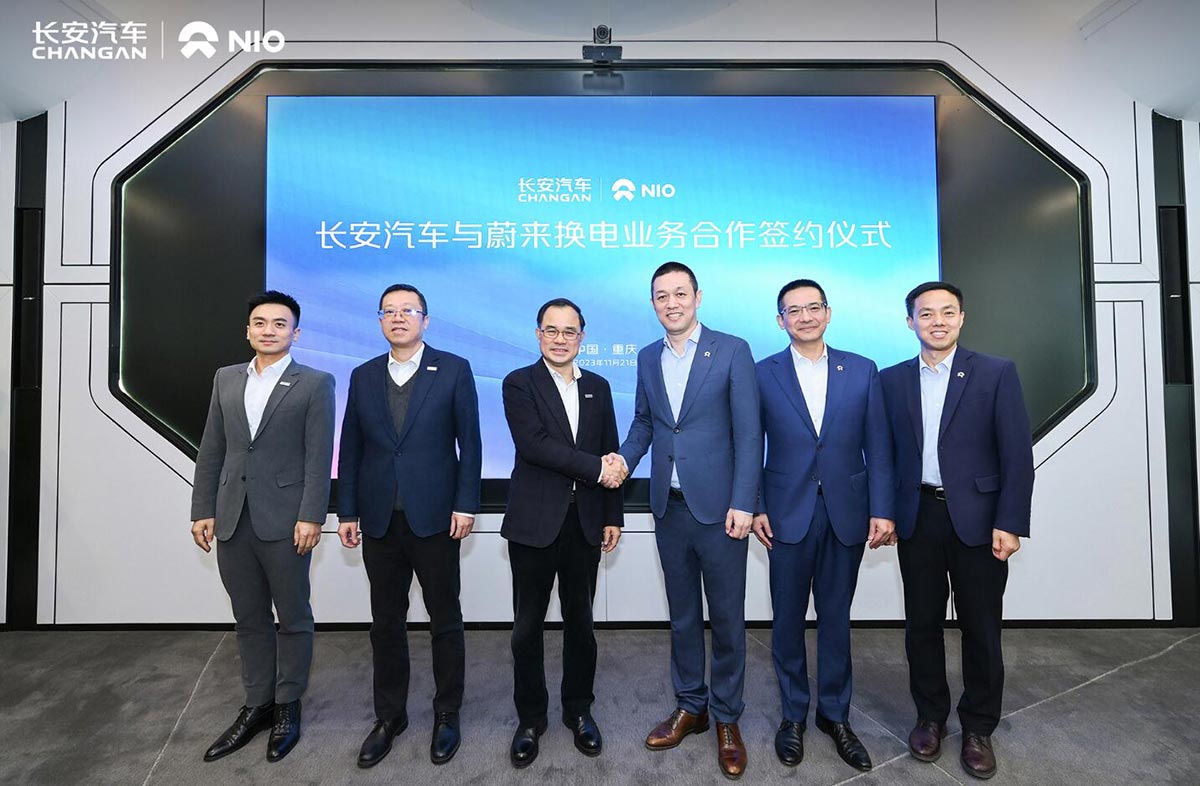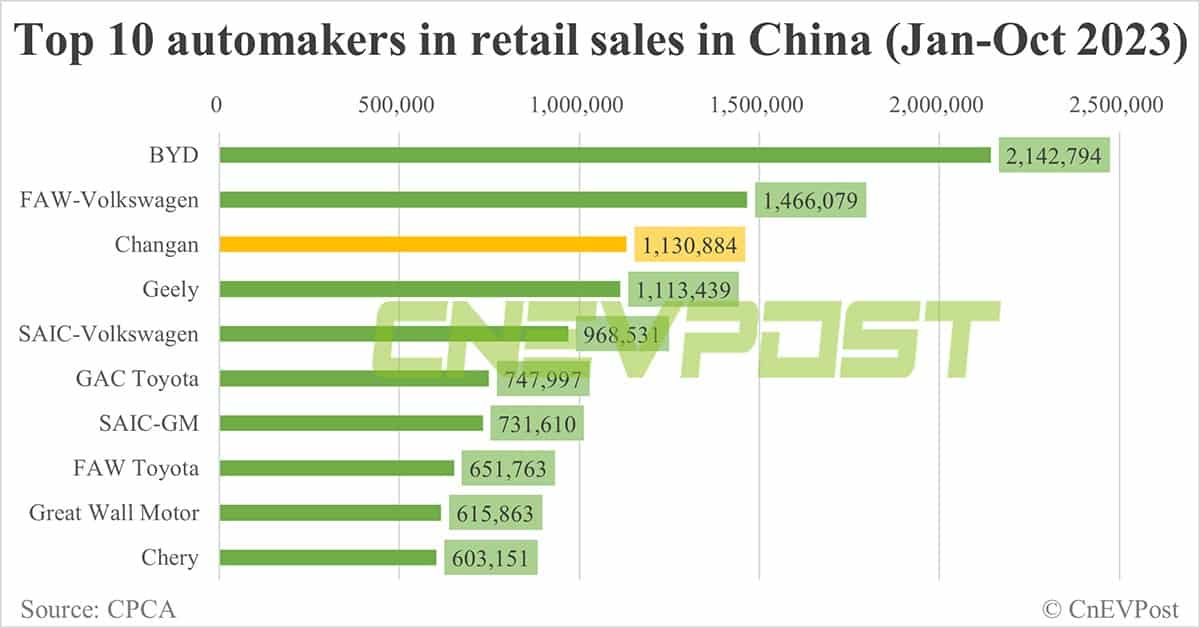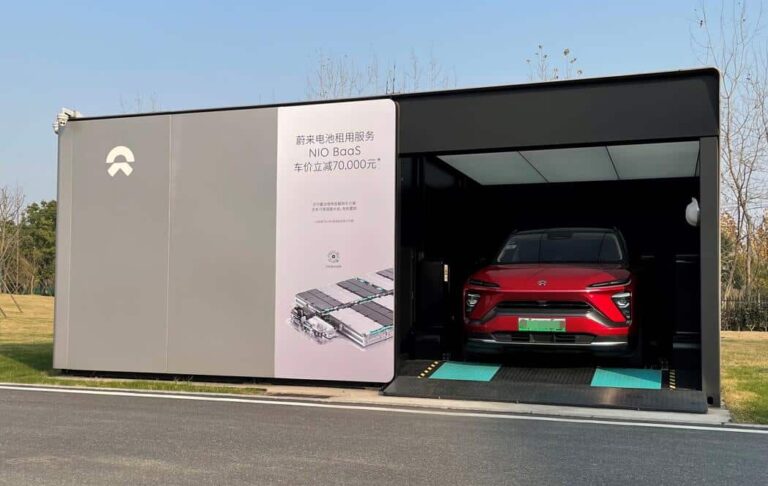The tie-up comes after Nio basically pulled out of a joint venture with Changan, marking the first external partner for Nio's iconic energy replenishment network.
(Image credit: Nio)
Chongqing Changan Automobile and Nio (NYSE: NIO) have partnered on battery swap network sharing, marking the first external partner for the latter's iconic energy replenishment network.
Nio announced that it signed a battery swap business partnership agreement with Changan in Chongqing today.
The two will jointly facilitate the formulation of standards for swappable batteries, build and share the battery swap network, develop swappable vehicles, and establish an efficient battery asset management mechanism, Nio said.
This is Nio's renewed tie-up with the traditional automotive giant after it essentially pulled out of a joint venture it had formed with Changan a few years ago.
"As Nio started battery swap from the very beginning, it has been ready to open up its technologies and infrastructure to the entire industry," said William Li, founder, chairman and CEO of Nio, according to an English-language press release.
"Similar to the cloud service provided by Internet companies, Nio's Power Swap network and Power Cloud also followed the path along which we started with developing infrastructure and achieving a closed loop internally, and then open to others after validating the service across various scenarios," Li added.
After five years of development, Nio has accumulated extensive experience in the development, construction and operation of battery swap stations and is ready to open up to the entire industry, Li said.
"As a leading automotive company in China, Changan Automobile has demonstrated great determination and strong execution in electrification and transformation. With this partnership, Nio and Changan Automobile will jointly contribute to the development and transformation of the industry," Li said.
Changan is headquartered in Jiangbei district in the southwestern Chinese city of Chongqing, and is one of China's largest car companies.
In the January-October period, Changan's retail sales in China were 1,130,884 units, up 12.5 percent year-on-year, to rank third with a 6.5 percent share, according to the China Passenger Car Association (CPCA).
BYD and FAW-Volkswagen were in the top two with 12.4 percent and 8.5 percent share respectively during the period.
In the January-October period, Changan sold 298,024 units of new energy vehicles (NEVs) and was ranked No. 6 in the CPCA's list of top NEV sellers. Nio was ranked No. 9 in the list with 126,067 units.
"As China is doubling down on new energy and smart connected vehicles, the implementation of Nio's battery swapping model marks a significant milestone for the industry," said Zhu Huarong, chairman of Changan.
"The partnership between Changan Automobile and Nio on battery swap is of great importance, contributing to the high-quality development of China's new energy vehicle industry. This partnership with Nio won’t be limited to battery swap," Zhu added.
The two companies will continuously strengthen their cooperation in other platform and fundamental areas, including energy, charging and swapping, vehicle development, and ecosystem, so as to jointly promote the high-quality development of the industry and build a sound, shared and mutually beneficial ecosystem, Zhu said.
Nio and Changan had worked together a few years ago, when the two set up a joint venture, Changan Nio, on July 10, 2018, with each party holding 50 percent of the shares at the time. The partnership was one of the earliest cases of cooperation between a new Chinese car-making force and a legacy automaker.
However, Changan Nio was slow to act in the first few years of its existence, and Nio, despite its strengths in intelligence and electrification, had no time to focus on the joint venture.
Nio's stake in Changan Nio was reduced from 50 percent to 4.62 percent at the end of 2020, while Changan's ownership increased to 95.38 percent.
At the end of May 2021, Changan Nio announced that it had changed its name to Avatr Technology, which does not carry the word "Nio", marking the end of the legacy carmaker's explorations with the new car maker.
After that, Nio's stake in Avatr was diluted with each of the latter's funding rounds. In August this year, Avatr closed a RMB 3 billion ($410 million) Series B round of financing, reducing Nio's stake to 0.67 percent.
In addition to Changan, Nio is in talks with more companies for similar partnerships.
Li said yesterday that Nio would announce the first company that will use its battery swap system on November 21, and that the company is in talks with four to five other companies for similar partnerships.
Battery swap is a huge first mover advantage for Nio and the time has come to open it up to the entire industry, Li said yesterday.
Nio unveiled its Nio Power replenishment system, centered on battery swap, on December 16, 2017, at its first Nio Day event.
The company completed its first battery swap station in Shenzhen on May 20, 2018. It saw its 1,000th battery swap station in China go live on July 6, 2022, and its 2,000th site go live on October 26, 2023.
As of today, the company has 2,113 battery swap stations in China, with a cumulative total of more than 32.4 million battery swap services, according to its charging map.
In the early days of battery swap service availability, there was a lot of skepticism from the general public.
However, Li was convinced from the beginning that this was the best route to take and used it as the starting point for Nio's underlying strategy, according to a December 2021 report by local media outlet LatePost.
Nio tried to headhunt one of Better Place's tech chiefs to join it in 2015, but the person was unwilling to move to China. Better Place was the first company in the world to adopt the battery swap model, but had gone bankrupt in 2013.
In November 2015, Shen Fei -- now vice president of Nio Power -- joined Nio, which at the time wanted to make large-scale battery swap stations, each storing 2,000 batteries and spreading them in four directions around cities, according to LatePost.
But this was inconvenient for users, so the final solution was changed to smaller, densely distributed stations across cities.
Nio owners initially had to pay to use battery swap stations, but this led to underutilization of these stations, so Nio started offering the service in August 2019 to users for free.
Nio gradually scaled back this free entitlement over the past few years as more and more owners began to embrace this way of getting a fully charged battery and the user base expanded.
While some of the earliest owners had unlimited free battery swap entitlements, subsequent purchasers were limited to six free services per month, which was later further reduced to four.
On June 12 of this year, the starting price of all new Nio models was lowered by 30,000 yuan, but the four free battery swaps per month became a paid option. Customers will have to pay RMB 30,000 for the four free monthly battery swaps.
Starting in August, Nio no longer offer this option and will provide 30 vouchers for new buyers in the past few months to experience battery swap for free.
($1 = RMB 7.1348)


